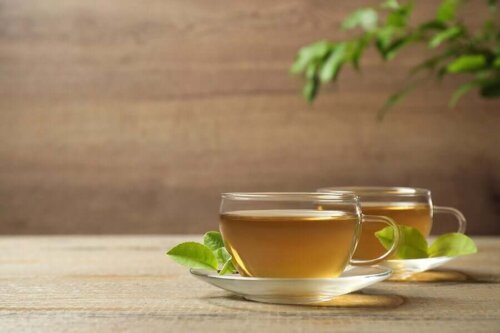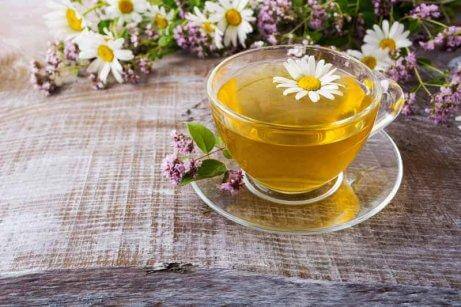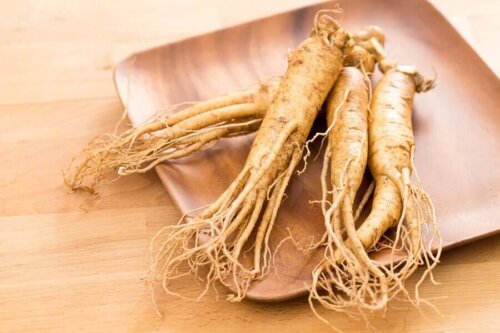5 Infusions That Support the Treatment of Gastritis

The treatment of gastritis may include medications such as antibiotics, proton-pump inhibitors, or antacids. The treatment also involves diet and lifestyle changes. However, did you know that these five medicinal infusions may help treat gastritis?
Thanks to the properties of some herbs and spices, their infusions are good remedies to minimize many of the symptoms of gastritis. In fact, they’re the best choices in mild cases of it because they’re natural and have fewer side effects.
What is gastritis?
Gastritis is a disease characterized by the inflammation or swelling of the stomach lining. It may be acute or chronic, depending on its cause or how long the symptoms last. It’s often caused by the H. pylori bacterium.
However, it could also be related to excessive alcohol consumption, prolonged use of nonsteroidal anti-inflammatory drugs (NSAIDs), stress, or tobacco use, among others.
Some of the symptoms of this condition are indigestion, nausea, vomiting, and feeling of fullness. In more severe cases, such as erosive gastritis, you may also experience symptoms such as black or tarry stools, vomiting blood, swelling, and severe abdominal discomfort.
5 Infusions that support the treatment of gastritis
The clinical manifestations of gastritis should be evaluated by a professional. This is because they’re often similar to those of other digestive disorders. Your doctor must confirm the diagnosis with a physical examination and blood, stool, or breath tests. They may also suggest an endoscopy or biopsy.
If the condition is severe, it’s imperative to follow the medical treatment prescribed by your doctor to see an improvement. If your condition is mild, then habit changes and some natural supplements may help. Continue reading to learn about some medicinal infusions that can support the treatment of gastritis.
1. Green tea sweetened with mānuka honey

Green tea with manuka honey is one of the best treatments for gastritis. A study determined that its consumption may minimize the risk of infection by H. pylori bacteria, the main culprit of this disease.
Ingredients
- Water (250 ml)
- 1 tsp. of green tea (7 g)
- 1 tbsp. of mānuka honey (15 g)
Preparation
- Firstly, add the green tea into a cup of boiling water
- Then, cover and let the drink stand for about ten minutes
- After this time, strain it and add the honey
- Drink twice a day, at least three times a week
2. Ginger infusion
Gingerol and the other active compounds of ginger have positive effects on the control of acute and chronic gastritis. These substances help to minimize stomach lining inflammation and inhibit the growth of some strains of the H. pylori bacterium.
Ingredients
- 1 c. of water (250 ml)
- Honey (optional)
- 1 tsp. of ground ginger (7 g)
Preparation
- Firstly, add a teaspoon of ground ginger to a cup of boiling water
- Then, cover the infusion and let it stand
- When it’s warm, add the honey
- Drink two cups a day until you feel better
3. Chamomile infusion

This tea can relieve some of the symptoms associated with gastritis, such as upset stomach and slow digestion.
It isn’t the most powerful treatment for gastritis. However, it’s a good complement to relieve associated symptoms such as indigestion, inflammation, and heartburn. This medicinal plant is safe, even for children.
Ingredients
- 1 c. of water (250 ml)
- Honey (optional)
- 1 tbsp. of dried chamomile flowers
Preparation
- Firstly, pour the chamomile flowers into a cup of boiling water
- After five to ten minutes, strain the drink
- Sweeten with honey
- Drink two to three cups a day to relieve your symptoms
This may interest you Find Relief from Your Gastritis Symptoms with These 7 Fruits
4. Mint tisane
This is one of the most popular remedies to treat gastritis and digestive system discomfort. Mint tea is a traditional preparation used to relieve abdominal cramps, gas, and excess acidity. In fact, it helps reduce inflammation.
Ingredients
- 1 c. of water (250 ml)
- 1 tbsp. of mint leaves (15 g)
Preparation
- Firstly, place the mint leaves in a cup of boiling water
- Let the drink steep for ten minutes
- Then, strain and drink it
- Finally, drink up to three cups a day
5. American ginseng infusion

American ginseng is helpful in the treatment of gastritis. It’s not as popular as other natural remedies but people use it to improve digestion, reduce vomiting, and relieve an inflamed colon. It also reduces inflammation of the stomach lining.
Ingredients
- 1 c. of water (250 ml)
- 1 tsp. of American ginseng (7 g)
Preparation
- Firstly, grind the American ginseng
- Then, add it to a cup of boiling water and leave it over low heat for two minutes
- After this time, cover and let the infusion stand
- Then, strain it after ten minutes
- Finally, consume this tea when you have gastritis symptoms or once to twice a day
Caution: Skip ginseng if you’re taking medication for depression or diabetes. You should also take it with caution if you suffer from hypertension and/or nervous system disorders.
Conclusion
Consuming these medicinal infusions can support the treatment of gastritis, minimizing its main symptoms. However, they shouldn’t replace medical treatment.
In addition, it’s important to ask about possible side effects in some cases to avoid discomfort and extend recovery time.
All cited sources were thoroughly reviewed by our team to ensure their quality, reliability, currency, and validity. The bibliography of this article was considered reliable and of academic or scientific accuracy.
- Boyanova, L., Ilieva, J., Gergova, G., Vladimirov, B., Nikolov, R., & Mitov, I. (2015). Honey and green/black tea consumption may reduce the risk of Helicobacter pylori infection. Diagnostic Microbiology and Infectious Disease. https://doi.org/10.1016/j.diagmicrobio.2015.03.001
- Mahady, G. B., Pendland, S. L., Yun, G. S., Lu, Z. Z., & Stoia, A. (2003). Ginger (Zingiber officinale Roscoe) and the Gingerols Inhibit the Growth of Cag A+ Strains of Helicobacter pylori. Anticancer Research.
- Haniadka, R., Saldanha, E., Sunita, V., Palatty, P. L., Fayad, R., & Baliga, M. S. (2013). A review of the gastroprotective effects of ginger (Zingiber officinale Roscoe). Food and Function. https://doi.org/10.1039/c3fo30337c
- Srivastava, J. K., Shankar, E., & Gupta, S. (2010). Chamomile: A herbal medicine of the past with a bright future (review). Molecular Medicine Reports. https://doi.org/10.3892/mmr.2010.377
- Cash, B. D., Epstein, M. S., & Shah, S. M. (2016). A Novel Delivery System of Peppermint Oil Is an Effective Therapy for Irritable Bowel Syndrome Symptoms. Digestive Diseases and Sciences. https://doi.org/10.1007/s10620-015-3858-7
- SAITO, H., MORITA, M., & TAKAGI, K. (2012). PHARMACOLOGICAL STUDIES OF PANAX GINSENG LEAVES. The Japanese Journal of Pharmacology. https://doi.org/10.1254/jjp.23.43
This text is provided for informational purposes only and does not replace consultation with a professional. If in doubt, consult your specialist.








